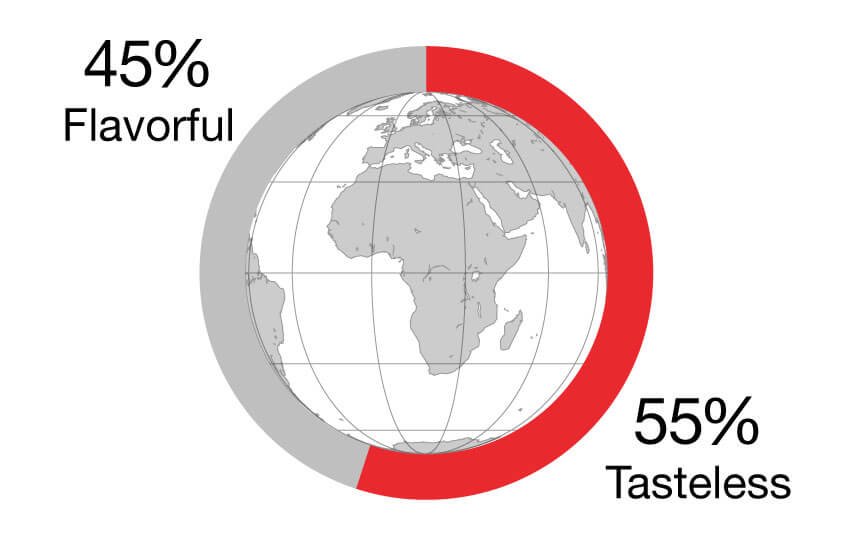It’s possible for low sodium foods to taste good; why don’t more people know?
The Ajinomoto Group conducted the SALTS (Sodium Alternatives and Long-Term Solutions) Survey across seven global markets in North America, Europe and APAC to understand consumers’ attitudes towards sodium and identify the types of interventions companies and governments could use to reduce sodium consumption overall.
Some food companies are doing low-sodium foods wrong

Food companies must explore new solutions that reduce sodium and deliver on taste while remaining affordable. Flavor preference varies by country, but the use of umami is a promising solution that remains largely unexplored — except by the Ajinomoto Group. Ajinomoto Group believes that salt reduction can be achieved by using taste sensations other than saltiness, such as adding deliciousness through umami, enhancing flavor and aroma with spices, and increasing taste contrast with sourness. Did you know? Monosodium glutamate (MSG), or umami seasoning, has 2/3 less sodium than table salt and can be used in the place of some salt to reduce the sodium in a dish by up to 61% without compromising flavor.
What would it take for consumers to choose low-sodium foods?
We know that consumers prioritize taste above all else, so the only way this is successful is with innovative actions by food companies that lead to a shift in consumers’ perception of low-sodium foods. Food companies must change products, create new products, educate about delicious salt reduction, and change the way low-sodium products are marketed. Ultimately, involve consumers.

Consumers believe that high sodium intake is everyone else’s problem but their own.
People know that too much sodium is bad for one’s health at any age, but they do not see this as a concern that impacts them personally.

Family Cares Even if You Don’t
Despite noted health benefits, today less than half of consumers feel it is important to reduce their sodium intake. Parents, family and partners were identified as the people that likely do care about your sodium consumption.
Consumers want everyone else to solve the problem of sodium intake, rather than making personal changes.
The stated top three motivators to eat less sodium are conceptual at best. Successfully changing consumers’ behavior and sodium intake will require cooperation across the entire food system. Given these circumstances, Ajinomoto Group believes it is essential that food companies promote salt reduction to support proper salt intake and contribute to the improvement of public health around the world. Ajinomoto Group is doing the following to reduce salt intake, contributing to a sustainable improvement in nutrition:
- The Ajinomoto Group believes that the key factor to changing consumer behavior regarding sodium intake is to maintain deliciousness and satisfaction of lower sodium products or meals. We are prioritizing product reformulation and providing information to help people improve their health and nutrition through easy recipes on product packaging and website.
- The Ajinomoto Group is working together with governments, communities, retailers, food manufacturers, and the media to create an environment that promotes salt reduction.
- Ajinomoto co-chairs the Japanese chapter of the Consumer Goods Forum’s Collaboration for Healthier Lives. It is working with 12 other Japanese companies to extend healthy life expectancy in Japan by preventing non-communicable diseases (NCDs), which can be influenced by diet and lifestyle choices, such as sodium intake levels.
- We are proud to be among the hundreds of global businesses that have signed The Business Declaration on Food Systems Transformation. This declaration, an official annex to the UN Secretary-General’s Statement of Action for the UN Food Systems Summit, is the private sector’s commitment to doing its part to ensure “equitable, net-zero and nature-positive food systems that can nourish all people.”
Consumers’ Top Three Motivators to Eat Less Sodium:
Remove high sodium products from grocery shelves
Government to lower the recommended amount of sodium in guidelines
Factual media about sodium and health
Ajinomoto Global SALTS Survey Reports
Here are the country reports for our first SALTS (Sodium Alternatives and Long-Term Solutions) Survey.
- Ajinomoto Global SALTS Survey - Global Report
- Ajinomoto Global SALTS Survey - Brazil Report
- Ajinomoto Global SALTS Survey - France Report
- Ajinomoto Global SALTS Survey - Indonesia Report
- Ajinomoto Global SALTS Survey - Japan Report
- Ajinomoto Global SALTS Survey - Thailand Report
- Ajinomoto Global SALTS Survey - US Report
- Ajinomoto Global SALTS Survey - UK Report
Content you may like

Delicious Salt Reduction
Our IntentionExcessive intake of salt is a global health challenge. The Ajinomoto Group leverages our unique amino acid technologies —“AminoScience”— delivering deliciousness through umami and ...
